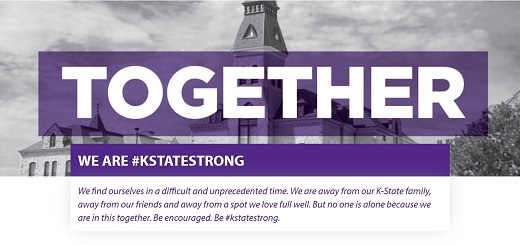07/15/20
K-State Current - July 15, 2020
K-State Current is a weekly news update for the Kansas Board of Regents to apprise the Regents on a few of the many successes and achievements made by K-State faculty, staff and students.
K-State News
Visit K-State’s “We Are #KStateStrong” site to view brief videos designed to keep the K-State family engaged, connected and inspired during these challenging times.
University signs research agreement for COVID-19 vaccine candidate
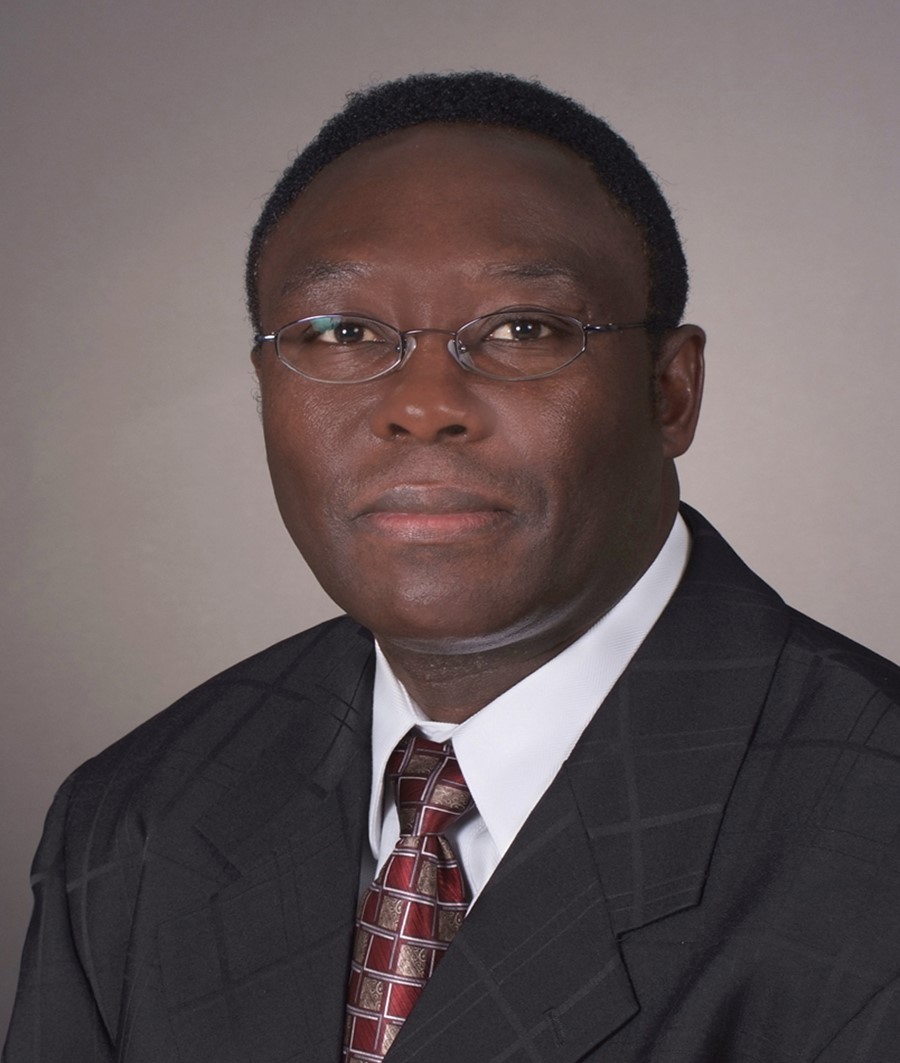 Kansas State University has signed a new preclinical research and option agreement with Tonix Pharmaceuticals, a clinical-stage biopharmaceutical company, to develop a vaccine candidate for the prevention of COVID-19.
Kansas State University has signed a new preclinical research and option agreement with Tonix Pharmaceuticals, a clinical-stage biopharmaceutical company, to develop a vaccine candidate for the prevention of COVID-19.
The inventor of the technology, Waithaka Mwangi, professor of diagnostic pathobiology in the K-State College of Veterinary Medicine, will direct the research, which is based on a new vaccine platform that his research team developed for bovine parainfluenza 3 virus, known as BPI3V, which is closely related to human parainfluenza 3 virus.
"A weakened BPI3V has previously been shown to be an effective vaccine vehicle in humans. More importantly, following extensive testing, BPI3V was shown to be safe and stable in infants and children," Mwangi said. "The vector is well suited for mucosal immunization using a nasal atomizer, but it can also be injected. Therefore, BPI3V is suitable for development of COVID-19 vaccine candidates."
The researchers focused on the most critical protein of coronaviruses: the spike protein. When a person is exposed to the virus, this protein is involved in the infection of the host cell. The vaccine candidate developed at K-State has been engineered to display the spike protein in a manner that mimics the actual virus.
While the majority of vaccines that are currently being developed will be injected into the body, according to Mwangi, the best vaccine will be one that will trigger immune protection, such as Immunoglobulin A, or IgA, at the mucosal surface, the portal of virus entry. IgA plays a crucial role in the immune function of mucous membranes. Instead of being injected, Mwangi's vaccine candidate would be sprayed in the nose to trigger the IgA response and block the virus's spike protein from infecting the host cells. The vaccine will also induce T cell responses capable of killing infected cells.
The research agreement, coordinated through K-State Innovation Partners, is the fourth license agreement between K-State and corporate partners on technologies related to COVID-19.
"The team at K-State Innovation Partners enjoyed working with Dr. Seth Lederman and his team from Tonix to efficiently negotiate an exclusive, field-of-use option and sponsored research agreement to fund additional research at the Biosecurity Research Institute on Dr. Mwangi's COVID-19 vaccine candidates," said Bret Ford, director of business development and licensing for K-State Innovation Partners. "The negotiations were approached with a high sense of urgency and we look forward to the company potentially commercializing our vaccine candidates to provide a solution for this global pandemic."
Mwangi's research will be conducted at the university's Biosecurity Research Institute in Pat Roberts Hall, a biosafety level-3 facility.
"As the world's foremost global food and biosecurity science university, K-State is committed to understanding and combatting zoonotic diseases and the viruses that cause them like SARS-CoV-2," said Peter Dorhout, vice president for research at K-State. "To deploy our innovations at scale, our faculty need to combine forces with collaborative corporate partners like Tonix Pharmaceuticals as part of our land-grant mission to serve."
K-State Innovation Partners finishes year with successful economic engagement activity
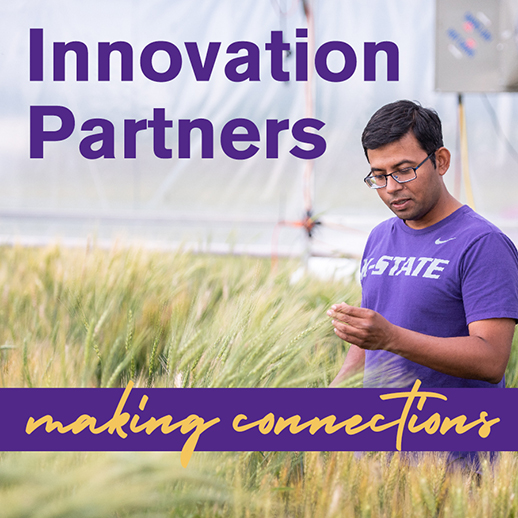 K-State Innovation Partners ended fiscal year 2019 posting a total of 70 invention disclosures, as well as 15 patents and 26 licensed technologies. This activity provided more than $2.8 million in licensing revenue and more than $2.1 million in facilitated sponsored research to Kansas State University.
K-State Innovation Partners ended fiscal year 2019 posting a total of 70 invention disclosures, as well as 15 patents and 26 licensed technologies. This activity provided more than $2.8 million in licensing revenue and more than $2.1 million in facilitated sponsored research to Kansas State University.
Fiscal year 2020 is also already looking bright with the organization reporting 69 invention disclosures, 22 patents and 34 license agreements through May 2020.
"Commercializing technology is one step in K-State's process of translating ideas, discoveries and technologies from the lab to the marketplace," said Chris Brandt, chief tech transfer officer. "The fiscal year 2019 commercialization successes are reflective of how K-State addresses the challenges facing society while also driving economic growth."
According to AUTM, a nonprofit comprising more than 3,000 members and more than 800 universities around the globe, K-State ranks in the Top 50 for intellectual property disclosures, total licensing revenue and license revenue per active license.
"In this time of economic uncertainty, it is more important than ever to protect innovations and license the technologies to existing companies and startups. Our emerging technologies can help current companies or be the foundation of new industries in Kansas," said Peter K. Dorhout, vice president for research.
In addition to technology commercialization efforts, to date, Innovation Partners has advanced economic development in the region by assisting with 174 economic partnerships, attracting 23 companies to establish or expand a presence in Kansas and launching or investing in 18 K-State-related companies.
"We want to bring the knowledge generated at the university to do what's best for Kansas businesses, families and prosperity," said Kent Glasscock, CEO of Innovation Partners. "We strive to take relationships beyond transactional to more strategic and ultimately leverage them into economic growth opportunities for the state."
Innovation Partners has created almost 600 new jobs in the region with average salaries of more than $56,000 and totaling more than $33 million in annual payroll.
"Innovation Partners continues to promote the successes of K-State faculty, researchers and students to ensure that technologies developed at K-State can get into the hands of the public where they can create jobs and improve lives," Glasscock said.
In fiscal year 2020, the Kansas State University Research Foundation and Institute for Commercialization merged to form K-State Innovation Partners. The merged organization continues to be committed to collaborating with university, industry and communities to deliver a streamlined mission of corporate engagement, technology commercialization and economic development.
K-State Faculty Highlights
Biologist receives National Science Foundation grant to fund research on honeybees
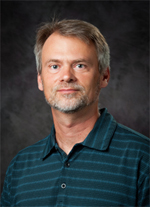 The National Science Foundation has awarded $177,191 in support of a new research project whose goal is to produce cell lines from the European honeybee, Apis melifera. Rollie Clem in the Division of Biology will carry out the research in collaboration with Carol Fassbinder-Orth at Creighton University and Scott Santos at Auburn University. A separate award of $122,719 was made by the National Science Foundation to Fassbinder-Orth in support of the project.
The National Science Foundation has awarded $177,191 in support of a new research project whose goal is to produce cell lines from the European honeybee, Apis melifera. Rollie Clem in the Division of Biology will carry out the research in collaboration with Carol Fassbinder-Orth at Creighton University and Scott Santos at Auburn University. A separate award of $122,719 was made by the National Science Foundation to Fassbinder-Orth in support of the project.
Honeybees and other pollinators are vital to agriculture and ecosystems, but their populations are in decline worldwide. One of the major contributing factors to weakening honeybee health is that they are infected by a variety of viruses. However, the study of honeybee viruses has been greatly hampered by a lack of reliable cell lines, especially immortalized cell lines — cell lines that are able to proliferate indefinitely, similar to cancer cells.
Virology research relies heavily on being able to isolate viruses and study their replication and other characteristics in controlled environments away from other microbes. Immortalized cell lines are vital for this type of research because they provide a consistent, renewable source of cells. But there are currently no available immortalized cell lines produced from any hymenopteran insect: bees, wasps and ants.
"Essentially all honeybees are infected with one or more, often several, viruses at any given time," Clem said. "This, plus the fact that most honeybee viruses will not replicate in cells from any other organism, currently makes it very difficult to isolate and work with these viruses."
The two-year project was funded through the EArly-concept Grants for Exploratory Research, or EAGER, mechanism, which funds novel ideas that are high risk/high reward in nature. The research team will use methods established in the model insect Drosophila melanogaster to attempt to produce immortalized cell lines from Apis melifera.
Once established, the researchers will eliminate endogenous viruses from the immortalized cells using methods established in other insect cell lines, which will allow researchers to use the immortalized bee cell lines to isolate honeybee viruses and work with them individually for the first time. The cell lines produced as a result of this award will be important resources for other researchers around the world. The work will also involve outreach efforts, both at K-State and at Creighton University, to educate the public on the importance of honeybee health to society.
Vara Prasad to serve on new international commission on sustainable agricultural intensification
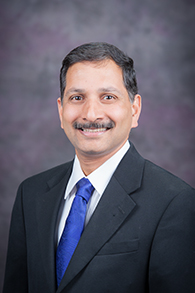 Vara Prasad, university distinguished professor of agronomy and director of the Feed the Future Innovation Lab for Collaborative Research on Sustainable Intensification, or SIIL, at K-State, has been selected to serve on the Commission on Sustainable Agriculture Intensification, or CoSAI. The commission consists of scholars around the world with experience in the Global South. These scientists, experts and decision-makers are serving as CoSAI commissioners to collect and assess evidence to accelerate the urgently needed transformation of agriculture.
Vara Prasad, university distinguished professor of agronomy and director of the Feed the Future Innovation Lab for Collaborative Research on Sustainable Intensification, or SIIL, at K-State, has been selected to serve on the Commission on Sustainable Agriculture Intensification, or CoSAI. The commission consists of scholars around the world with experience in the Global South. These scientists, experts and decision-makers are serving as CoSAI commissioners to collect and assess evidence to accelerate the urgently needed transformation of agriculture.
Initiated by the Consultative Group of International Agricultural Research, or CGIAR, Program on Water, Land and Ecosystem, CoSAI will work over 18 months to guide investments in agricultural innovation. The CGIAR is a global research partnership for a food secure future dedicated to reducing poverty, enhancing food and nutrition security, and improving natural resources.
The SIIL is focused on conducting innovative research, education and outreach activities, and building human and institutional capacity to serve smallholder farmers across the globe. The SIIL works to sustainably increase agricultural productivity and income that provides food and nutritional security to farmers in Africa and Asia, while maintaining a strong focus on natural resource management, diversification and integrated farming systems research. The SIIL is funded by United States Agency for International Development.
"It is truly an honor and privilege for me to serve on this commission and I am looking forward to working with other commissioners and scholars to contribute and meet the goals and objectives of the CoSAI," Prasad said. "I am thankful for the opportunities I had to work and learn from scholars, faculty and students from across the world."
Prasad has extensive research, education and outreach experience in several countries in Africa and Asia on aspects related to climate change, natural resource management and sustainable intensification. Over the last 15 years at K-State he has trained more than 130 research scholars and graduate students from 26 different countries. He has traveled and presented his research in 40 countries around the world. He has also published more than 250 peer-reviewed journal articles and book chapters on topics related to climate change, abiotic stresses and crop management.
"Selection of Prasad on this commission is a testament of his leadership, accomplishments of the SIIL, and his team members, collaborators and partners," Nina Lilja said, associate dean of international agricultural programs. "A better understanding of sustainability and resilience of global food systems and farming communities is key to solving the challenges of food production and environmental protection."
"K-State has a long history of research and capacity building activities across the globe, particularly in multiple countries across continents of South America, Africa and Asia, and international collaboration and partnerships are critical to address current crises in the food and agricultural systems including climate, energy, water soil and health," said Chuck Rice, university distinguished professor of agronomy at K-State and chair of the Board on Agriculture and Natural Resources, National Academies of Science, Engineering, and Medicine. "The work of the SIIL aligns with the recommendation of a recent report from the National Academies that emphasizes the need for transdisciplinary science and systems approaches to solve agriculture’s most vexing problems. Furthermore, the recent U.S. Department of Agriculture Science Blueprint emphasizes the need for sustainable agricultural intensification as one of the key themes of its programs."
Progress toward feeding growing global populations, while protecting the natural environment is behind schedule and calls for solutions to further meet the first two key sustainable development goals of no poverty and zero hunger. The CoSAI commissioners are setting out to fill persistent evidence gaps to support policy-makers and private sector investors to boost investments in innovation and accelerate progress towards sustainable intensification of agriculture. Their efforts will complement insights derived from past commissions and research on agriculture, food and the environment.
"Our 22 newly appointed commissioners include some of the most eminent experts and decision-makers from Africa, Asia and Latin America," said Ruben Echeverria, chair of CoSAI. "They are uniquely placed to bring to light the challenges the Global South is facing in developing and adopting innovations that can help meet our food needs, whilst regenerating the natural environment."
The CoSAI Commissioners will follow a process of open inquiry — a process that will call upon a wide range of input – from farmer organizations to policy-makers, researchers, civil society and leading thinkers — to share their solutions to these big challenges, and debate the practicalities of implementation, taking a Global South lens.
The results of CoSAI’s work will guide global and national decision-makers to support approaches to innovation that boost food production and access, ensure natural environments thrive, and reduce poverty and inequality.
CoSAI will have its official launch in June in a global web event featuring prominent experts sharing their insights on the Global South’s food future.
K-State Student News
A new child care and education partnership: Kansas Institute for Early Childhood Education and Research
 The College of Health and Human Sciences and the Division of Student Life announce the creation of the Kansas Institute for Early Childhood Education and Research, a strategic partnership between the university's academic and service components.
The College of Health and Human Sciences and the Division of Student Life announce the creation of the Kansas Institute for Early Childhood Education and Research, a strategic partnership between the university's academic and service components.
Both units offer child care and education on campus, core components of their missions, at the Hoeflin Stone House Early Childhood Education Center — known as Stone House — and the Center for Child Development, or CCD. These facilities will merge under the institute, integrating the clinical field experience requirements for students and the expertise of the early childhood education teacher education program faculty in the Center for Child Development. The institute will be housed in the College of Health and Human Sciences with a director to be named.
Under the institute, the university will continue its commitment to offer high-quality affordable child care and education to the K-State and Manhattan communities. Families enrolled at Stone House will be guided through the enrollment process at the Center for Child Development and plans are underway for welcoming all families to the facility. Instructional faculty from Stone House will lead designated classrooms in the Center for Child Development. All classroom teachers and faculty will work collaboratively on curriculum and program design. Students in the early childhood education program will complete required clinical experiences in the center.
The institute will open to families on Aug. 10 at the Center for Child Development. Plans for the Stone House facility will be announced on a later date.
"Through this partnership between the College of Health and Human Sciences and the Division of Student Life, Kansas State University will take an important step forward in both serving the early childhood education needs of our university community while also advancing research in child development," said Charles Taber, provost and executive vice president. "The talented faculty and staff of the Kansas Institute for Early Childhood Education and Research will help create a better future for our university and our state by serving the education needs of our children."
Institute goals include expanding engagement of and access by academic programs across the university to support student learning and interprofessional development; support cross-disciplinary research on the science of child and family development, education and allied disciplines; and expanding on the university commitment to engagement and outreach with communities statewide and nationally on child and family development, early education and implications for research, policy and workforce development.
K-State's early childhood pre-service teacher education program, in the applied human sciences department, is accredited through the National Council for the Accreditation of Educator Preparation and approved through the Kansas State Department of Education to prepare students for birth through age 5 unified teacher licensure. Supervised clinical experiences with mentored opportunities in reflective practice are integral in course and curriculum requirements and completed at Stone House. The program is accredited by the National Association for Early Childhood Education, or NAEYC.
Under the institute, the Center for Child Development provides child care on the K-State campus serving children from birth to age 12. Initially founded as a parent cooperative in 1985, the university assumed administration in 2006. The center moved from Jardine to its current location in 2010 and greatly expanded in a state-of-the-art facility, which is licensed by KDHE and accredited by NAEYC.
Creation of the institute is consistent with the call by the Institutes of Medicine and the National Research Council in 2015 for institutions of higher education to reexamine their programs in light of the current state of the research on the science of child development, best practices care and education, and economic and workforce development. Specifically, institutions are charged to review and revise their programs, policies and infrastructure to support child development and a cross-departmental, cross-disciplinary foundation for academic programs preparing students for multiple and interprofessional roles.
Questions may be directed to Bronwyn Fees, associate dean for academic affairs in the College of Health and Human Sciences, at fees@k-state.edu.
